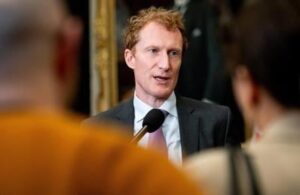“No one should have to worry about paying rent, buying groceries or additional childcare because of COVID-19,” say’s Trudeau
On Friday, Deputy Prime Minister Chrystia Freeland and Health Minister Patty Hajdu spoke about international travel amid the COVID-19 outbreak, specifically between the Canada-U.S. border, stating that “viruses don’t know borders” and that all Canadians should avoid any non-essential international travel.
Could Canada impose the type of strict travel bans seen in China, Italy, and the United States in response to the novel coronavirus?
According to Canadian constitutional experts: yes.
But any restrictions on travel would have to be “reasonable” and “demonstrably justified.”
This, University of Ottawa law professor Martha Jackman says, means that if the government were to limit or ban travel, decisions would need to be based on the “best information available” and the expert opinions of medical professionals.
“It would absolutely be a question of what’s the public health evidence of whatever restrictions are put in place,” Jackman said.
Canada’s Charter of Rights and Freedoms guarantees Canadian citizens and permanent residents the right to travel between provinces and territories and to leave and enter Canada as they wish.
These rights – considered “democratic” rights – are not subject to the Charter’s notwithstanding clause, meaning the government cannot pass legislation or regulations that limit Canadians’ freedom of mobility.
However, under extraordinary circumstances, such as an epidemic or matters of significant national importance, the federal government can use its emergency powers to impose restrictions that would otherwise be unjustified, Jackman said.
“If the federal, provincial or territorial governments were to impose travel restrictions… it would absolutely raise mobility rights concerns,” Jackman said.
“But obviously if those (restrictions) were put in place for public health concerns, it’s quite likely they’d be found reasonable by the courts.”
Governments tell Canadians to limit travel
On Friday, the federal government and national health officials urged Canadians to limit international travel to essential travel only.
Public Safety and Emergency Preparedness Minister Bill Blair said the government will restrict inbound international flights to a limited number of airports across the country. The purpose of this, Blair said, is to ensure border security officials have the resources they need to adequately screen passengers and assist those who need help.
Prime Minister Justin Trudeau, who is in self-isolation for 14 days due to his wife’s COVID-19 diagnosis – also said Friday that the government is looking at other possible options around travel, including looking at the country of origin of some flights and measures that could be taken.
Trudeau did not specifically say if the government is considering banning flights from certain countries or imposing restrictions for certain foreign nationals trying to enter Canada.
“Our assessment criteria for future decisions are entirely based on recommendations of experts and health-care professionals,” Trudeau said.
“We will not be ruling out any possible step.”
Measures must not be discriminatory, arbitrary
Unlike most sections of the Charter, mobility rights apply only to citizens and permanent residents. This means citizens of other countries do not have a fundamental right to enter Canada.
But this doesn’t mean Canada can impose arbitrary rules, Jackman said. Even in emergency situations, Canadian courts would expect the government to act fairly and to not discriminate based on ethnicity, nationality or religion.
The government could close the infrastructure
Another possible option available to the government to slow the spread of COVID-19 could be to close infrastructure, rather than imposing a travel ban.
Emmett Macfarlane, a political science professor from the University of Waterloo, said that in an emergency, provincial and federal governments could close airports, train stations, and border crossings.
But the extent of this type of action would depend entirely upon the seriousness of the situation – in other words, how bad things get, Macfarlane said.
Like Our Story ? Donate to Support Us, Click Here
You want to share a story with us? Do you want to advertise with us? Do you need publicity/live coverage for product, service, or event? Contact us on WhatsApp +16477721660 or email Adebaconnector@gmail.com




